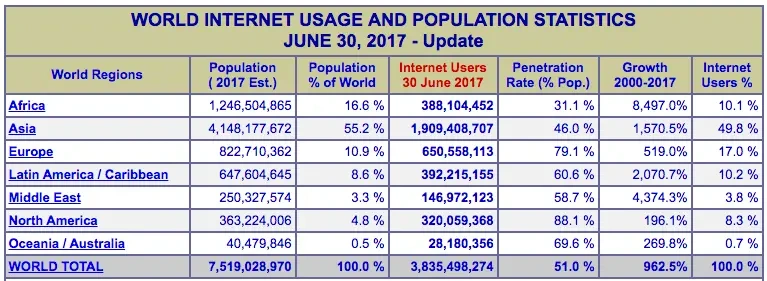It seems like a logical step; you’ve successfully grown your company and established a decent market penetration. And now, you’re ready to expand from your home turf and enter a new market. By moving out of your comfort zone, you’ll face new competitors, a different crowd, and other unknown threats. Hurdles, a tech-savvy SaaS pioneer such as yourself must know how to overcome.
Speed is the essence of war
Take advantage of your enemy’s unpreparedness; travel by unexpected routes and strike him where he has taken no precautions. Especially in tech companies, we have seen this happen before; when new upcoming technologies go from poking the market leader, to overtaking them. Blackberry & Nokia to name a few, simply got too comfortable and felt untouchable. By focusing on the tens of millions of customers it already had, Blackberry missed out on the billions that were to come.
The good news is you’re selling something that anyone with a laptop and a decent internet connection can use. For the sake of this argument, let’s assume all internet users have access to a computer. That means 51% of the world population is a potential client. And, since you’re part of the wonderful world of SaaS, there’s no real challenge in your services’ logistics—apart from using a trusted Content Delivery Network such as AWS.
The bad news is there’s a huge pie to divide, and competition will always be lurking—sniffing out your flaws to copy your service, improve it and overtake your success. Sure, you might have convinced multiple stakeholders at multinational XYZ into buying your product, and you've built a great relationship, but loyalty left the building when a shadow-it solution sneaked in your company and got all departments using it. Wait, what?
I’m talking about solutions and applications that are used throughout your organization without the knowledge and/or approval of your IT department. Think of your typical “pdf to word” converter, free messaging service Slack and, in some cases, Google Drive. Like our CEO Chris Hall said in an interview about UX and the future of software: “In tech, and especially now, it's not the bigger fish eating the smaller fish, it's the quicker fish eating the slower fish.”
If you know the enemy and know yourself, you need not fear the result of a hundred battles
This statement refers to your strengths and weaknesses and how well you understand them. It’s the SWOT-analysis of the early days. The more you know, the better you can adapt your strategy and enter new markets successfully. Start by knowing every inch of your own company, its position, and its vulnerable weaknesses—because that’s where your competition will strike. Discover and learn everything there is to know about the enemy, their limitations, behaviour, and strengths. It would be foolish if you assumed that the new market you are entering would respond to your marketing tactics in the same way. This also means that you should be smart enough to stop an approach that is clearly not working.
When Bynder was opening its Dubai office, we experimented and researched a lot. We tried out English ads, Arabic ads, technical and non-technical jargon, just to find out what resonated with the audience. But there are always cultural sensitivities you might have missed or never heard of. So, before you try to enter a new market, make sure you know all the ins and outs, traditions, culture, competitors and the experience of being there. It is important to understand the overall competition and industry trends, and envision the arena in which you will do battle. Visit the country, talk to a local SaaS provider or potential client, and experience the culture. It won't take you long to realize that your 3G isn't working well during that cab ride from the airport, or that Spotify isn't allowed, but yet radio ads have a huge reach. There are always little things to learn or experience in exploring new terrain.
Treat your men as you would your own beloved sons. And they will follow you into the deepest valley.
Virtually every company claims that their employees are their most valuable resource. However, few of them actually walk the walk. When you're a startup, you have to convince your employees that you will beat the odds and disrupt the market that you are in—why else would we even try? To quote Simon Sinek on this one:
Those who believe what we believe offer their blood, sweat, and tears. Those who don’t believe what we believe demand more money or glory.
A lot of tech companies have set up shop in the Netherlands, making the demand for experienced developers extremely high, leading to very high salaries and secondary benefits that many startups can’t afford. So how do you establish a low turnover of employees? By offering something more valuable than money. Respect, love, freedom, and trust doesn’t cost you anything, but it does go a long way. Employees want meaningful work, and they want autonomy in how they work. What’s keeping you from giving them a remote week, unlimited holidays or writing them a short note on how you appreciate and value his or her work? Employees that feel valued, are more likely to go into battle with you—rather than switch sides.
Just like in Game of thrones, it’s the same as why Tyrion Lannister believes that Daenerys’s army of unsullied will beat Cersei’s Army:
My sisters army fights for her out of fear. The Unsullied will be fighting for something greater. They will be fighting for freedom, and the person who gave it to them. They will be fighting for you. And that is why they will triumph.
















